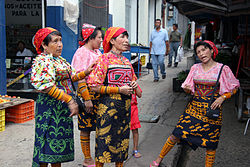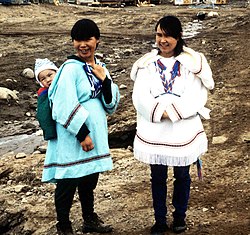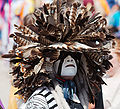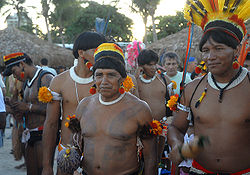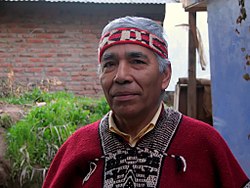Folk costume
This article needs additional citations for verification. (October 2010) |
Folk costume is clothing of an ethnic group, nation or region, and expresses cultural, religious or national identity. It includes both everyday and formal wear.
Terminology
[edit]Folk costume may also be called national costume, regional costume, traditional dress, traditional attire, folk attire, or regalia; an ethnic group's clothing may be called ethnic clothing or ethnic dress.
The word costume in "folk costume" is sometimes considered pejorative, particularly among Native Americans, as the word has more than one meaning.[1][2][3]
Overview
[edit]Following the rise of romantic nationalism in parts of Europe,[4] pre-industrial peasantry came to serve as an ideal of authenticity. Garments evoking peasant dress were made from traditional pre-industrial textiles.
In regions where Western dress styles are common, traditional garments are often worn during special events or celebrations. International events may cater to non-Western attendees with a compound dress code such as "business suit or national dress".
In some contemporary societies, traditional garments are required by sumptuary laws.
Africa
[edit]Central Africa
[edit]Cameroon
[edit]
Traditional clothing in Cameroon[5][6] includes the pagne, kabba, head tie (female), toghu, boubou, kwa, and gandura (male). Dress is highly dependent on region and ethnicity.
Central African Republic
[edit]Traditional attire of the Central African Republic includes the pagne and the boubou.
Chad
[edit]In Chad, folk attire includes the boubou, jalabiya, and pagne.
Democratic Republic of the Congo
[edit]Folk attire of the Democratic Republic of the Congo includes the pagne, Liputa style of dress, and kuba cloth.
Republic of the Congo
[edit]In the Republic of the Congo, the pagne and boubou are part of traditional attire.
Equatorial Guinea
[edit]The pano is part of the traditional dress of Equatorial Guinea.
Gabon
[edit]Traditional attire of Gabon includes the pagne, boubou, and the Abacost suit.[7]
São Tomé and Príncipe
[edit]The pano and boubou are traditional attire in São Tomé and Príncipe.
East Africa
[edit]Burundi
[edit]The imvutano is traditional clothing in Burundi
Comoros
[edit]Traditional attire of the Comoros includes lesso, shiromani, salouva, kandu, bwibwi for women, and kofia for men.[8]
Djibouti
[edit]In Djibouti, traditional attire includes the macawiis and koofiyad for men, and the dirac and garbasaar for women. The Afar people have their own style of traditional clothing.
Eritrea
[edit]Men in Eritrea wear Kidan Habesha as traditional dress. Women wear the zuria or Habesha kemis.
Ethiopia
[edit]Each ethnic group in Ethiopia has a traditional style of dress. Ethiopian traditional clothing includes the Ethiopian suit or Kidan Habesha for men, and the Habesha kemis for women.
Kenya
[edit]There is no official national costume of Kenya, but leso (kanga) is worn throughout the country.[9] Kikoi, similar to kanga fabric, is also widespread. All tribes have their respective traditional garments. For example, Maasai clothing includes traditional shuka and beadwork.[9]
Madagascar
[edit]
The lamba is part of the traditional dress of Madagascar.
Mauritius and Réunion
[edit]In Mauritius and Réunion, the sega is part of traditional clothing.
Rwanda
[edit]
The mushanana is traditional clothing in Rwanda.
Seychelles
[edit]
Seychelles traditional dress includes the kanmtole.
Somalia
[edit]In Somalia, traditional dress includes the kanzu or khamiis and kitenge. For men, traditional clothing also includes the macawiis and koofiyad. Women may wear the dirac, guntiino, and garbasaar.
Sudan
[edit]In Sudan, folk costume includes the jalabiyyah and taqiyyah. Men may wear turbans; women may wear the toob, a long garment.
Tanzania
[edit]Traditional dress in Tanzania varies by tribe, and may include the kanzu and kofia for men, and the kanga for women.[9]
Uganda
[edit]Folk costume in Uganda includes the kanzu and kofia (male), and the gomesi (female). In southwestern Uganda, women's traditional dress includes the mushanana.

North Africa
[edit]Algeria
[edit]
In Algeria, cultural dress includes the burnous, ghlila, caftan, gandoura, haik, jellaba, m'laya, and sarouel. In northern Algeria, clothing includes the karakou (in Algiers), labsa Naïlia (among Ouled Naïl), and labsa M'zabia (among Mozabite people). In northeastern Algeria, dress includes Gandoura Annabiya (in Annaba), qashabiya and melhfa chaouïa (among Chaoui people), labsa Kbaylia (among Kabyle people), and binouar Staifi (in Sétif). In northwestern Algeria, traditional dress includes the blouza in Oran and the chedda of Tlemcen. In southern Algeria, the tagelmust is traditional attire; traditional clothing of the Tuareg people includes the akhebay. In Western Algeria, Sahrawis wear the el-melhfa Sahraoui.
Egypt
[edit]
Traditional attire in Egypt includes the galabeya.
Libya
[edit]Traditional dress of Libya includes the jellabiya, farmla (embroidered vest), and fouta.
Morocco
[edit]In Morocco, traditional attire includes the djellaba, fez, balgha, and takchita.

Sahrawi Arab Democratic Republic
[edit]Cultural attire in the Sahrawi Arab Democratic Republic includes the darra'a for men and the el-melhfa Sahraoui for women.
Tunisia
[edit]
Traditional attire in Tunisia includes the jebba, chechia, and fouta.
Southern Africa
[edit]Angola
[edit]Traditional clothing in Angola includes the pano.
Botswana
[edit]In Botswana, traditional attire includes the ieteisi and tshega.
Lesotho
[edit]Traditional attire in Lesotho includes shweshwe clothing, basotho blankets, and mokorotlo.
Malawi
[edit]Chitenje is part of the traditional clothing of Malawi.
Mozambique
[edit]In Mozambique, cultural attire includes the capulana.[10]
Namibia
[edit]In Namibia cultural dress includes Herero traditional clothing, like the ohorokova dress and the otjikaiva hat.[10][11]
South Africa
[edit]In South Africa, traditional attire of Xhosa people includes the umbhaco for men and women. For women, dress includes the faskoti, inxili (sling bag), ncebetha, iqhiya, and ibhayi. For men, it includes the ingqosha, isidanga, and unngqa.[10] Among Zulu people, traditional clothing includes the isicholo, isidwaba, umutsha, and ibheshu.[10] For Sotho people, traditional dress includes shweshwe, basotho blankets, and mokorotlo. Afrikaners and Rooineks may wear a slouch hat, safari shirt, veldskoen, knee-high socks, khaki Bermuda shorts or trousers.
Zambia
[edit]In Zambia, traditional attire includes chitenje.
Zimbabwe
[edit]Traditional clothing in Zimbabwe includes the ibhetshu, isidwaba, isicholo, and chitenje.
West Africa
[edit]
Benin
[edit]In Benin, cultural attire includes the dashiki suit, fila gobi, abeti aja, and kufi for men, and the Iro ati Buba and wrapper set for women.
Burkina Faso
[edit]Cultural attire in Burkina Faso includes batakari for men and kaftan for women.
Cape Verde
[edit]In Cape Verde, traditional attire includes the pano de terra.
Côte d'Ivoire
[edit]In Ivory Coast, traditional clothing includes the kente cloth for men and kente kaba and slit set for women.
Gambia
[edit]Traditional clothing of the Gambia includes the boubou for men and kaftans for women.
Ghana
[edit]
In Ghana, traditional attire for men includes the kente cloth or Ghanaian smock (called fugu or batakari)[12] kufi, and agbada. For women, it includes the kente kaba and slit set.
Guinea
[edit]Traditional clothing of Guinea includes the boubou for men and kaftans for women.
Guinea-Bissau
[edit]Traditional clothing in Guinea-Bissau may vary by ethnic group. Traditional attire of the Fula people includes the boubou for men and kaftans for women.
Liberia
[edit]In Liberia, traditional attire includes the dashiki suit and kufi for men, and the buba and skirt set for women.
Mali
[edit]In Mali, traditional attire includes the grand boubou and kufi for men, kaftan for women, and bogolan.[12]
Mauritania
[edit]In Mauritania, traditional dress includes the darra'a for men and melhfa for women.
Niger
[edit]Traditional attire of Niger includes souban cloth, melhfa, babban riga, tagelmust, alasho for men, and kaftan for women.
Nigeria
[edit]
In Nigeria, each ethnic group has a style of traditional dress, worn mostly for special occasions such as weddings and national holidays. For men, traditional attire includes the agbada, dashiki or isiagu, and fila gobi or fila abeti aja. For women, it includes Iro ati Buba and wrappers.
Senegal
[edit]Traditional attire in Senegal includes the Senegalese kaftan and kufi for men, and the kaftan for women.
Togo
[edit]In Togo, cultural dress for men includes the batakari, agbada, and ewe kente cloth, and the pagne or kente kaba for women.
Americas
[edit]Caribbean
[edit]
Antigua and Barbuda
[edit]For women in Antigua and Barbuda, national attire is a plaid dress with white pinafore, designed by Heather Doram.
Bahamas
[edit]There is no official folk dress of the Bahamas, though clothing made with Androsia may be considered traditional attire. Junkanoo costumes can be considered folk costume but fall more into the sector of carnival dress than traditional garment.
Cuba
[edit]In Cuba, traditional dress includes the guayabera and panama hat for men, and the guarachera for women.[13]
Dominican Republic
[edit]Traditional attire in the Dominican Republic includes the chacabana and panama hat.
Dominica
[edit]The madras is part of traditional attire in Dominica.
Haiti
[edit]In Haiti, cultural attire includes the karabela dress for women and shirt jacket for men.
Jamaica
[edit]
Traditional attire in Jamaica includes the bandana cloth Quadrille dress for women, bandana cloth shirt and white trousers for men, and the Jamaican tam.
Puerto Rico
[edit]In Puerto Rico, men's traditional clothing includes the guayabera and panama hat. Women's traditional attire includes the enagua.[13]
Saint Lucia
[edit]The madras is part of traditional attire in Saint Lucia.
Trinidad and Tobago
[edit]Cultural dress varies in Trinidad and Tobago. Tobago has an Afro–Tobagonian creole culture with bélé costumes as their typical garment, commonly made of madras. Trinidad has no defined national garment. During cultural occasions, Afro–Trinidadian and Tobagonian men wear guayabera or dashiki, and women wear a booboo. Indo–Trinidadian and Tobagonian men wear kurta, dhoti, sherwani, and women wear sari, choli, and lehenga.
Central America
[edit]Belize
[edit]In Belize, among mestizos, traditional attire includes the huipil for women and the guayabera for men. Among the Maya peoples, all tribes wear distinct kinds of dress.
Nicaragua
[edit]Among women in Nicaragua, traditional attire includes the huipil and rebozo. Men wear the cotona.
Guatemala
[edit]In Guatemala, traditional clothing includes the huipil, corte skirt, and tocado for women, and the todosantero suit for men.
Panama
[edit]Traditional attire in Panama includes the pollera for women and montuno for men.
North America
[edit]Bermuda
[edit]Bermuda shorts are traditional clothing in Bermuda.
Canada
[edit]In Canada, different regions have different traditional clothing.
The traditional dress of First Nations peoples, which is often called "regalia", may include the button blanket, buckskins, moccasins, Chilkat blanket, Cowichan sweater, and war bonnet. Traditional attire of the Métis includes the ceinture fléchée, capote, and moccasins. In Nunavut and other Inuit communities, traditional clothing includes the parka, mukluks, and amauti.
For lumberjacks of Quebec and Ontario, traditional logging wear includes mackinaw jackets or flannel shirts, with headgear being a tuque or trapper hat; a good example is seen with folk characters like Big Joe Mufferaw.
In the Maritimes, Acadians wear their traditional heritage clothing on special occasions like the Tintamarre. The Scottish background in Nova Scotia has brought the Nova Scotia tartan as folk wear in the form of kilts, aboyne dresses, and trews for Scottish highland dance competitions.
In Quebec and among French Canadians, traditional clothing includes the ceinture fléchée, capote, and tuque.
In the Prairies, cowboy costume is common for events such as the Calgary Stampede, and is often worn with Calgary White Hats.
Newfoundland – Traditional mummers dress in masks and baggy clothes in Christmas season celebrations; the Cornish influence has also brought yellow oilskins and sou'westers as typical wear in coastal areas.
United States
[edit]In the United States, different regions have different traditional clothing.
Styles of traditional Native American clothing vary. Traditional pow-wow regalia for Plains Indians may include moccasins, buckskins, glass beads, breech clouts, and war bonnets or roaches. Among Alaska Natives, traditional attire includes kuspuks worn with dark pants and mukluks, as well as parkas. The clothing of the Yupʼik people is designed to keep the wearer warm and dry in cold weather.

Western wear is traditional dress in several areas of the United States, including Texas and the Southwest, and rural areas in the Midwest and the West. This attire, derived from Mexican vaquero and American pioneer garb, may include cowboy hats, Western shirts, cowboy boots, jeans, chaps, prairie skirts, and bolo ties.
Due to cold weather, clothing in northern areas—such as the Upper Midwest, Pacific Northwest, and northern New England—tends to include heavier materials. This may include flannel shirts or Buffalo plaid mackinaw jackets, and a knit cap or, in the case of the Upper Peninsula of Michigan, a Stormy Kromer cap. The attire of folk hero Paul Bunyan may represent this style.
In the Deep South, traditional attire includes white seersucker suits and string ties for men, and sun hats and large Southern belle-style dresses for women. The Cajun people of Louisiana traditionally wear the colorful capuchon for Mardi Gras celebrations. Historically, Creole women wore the tignon, mostly in plain or madras fabrics; it is now sometimes worn for heritage events or for cultural reasons. Gullah communities in the South Carolina Lowcountry and the Sea Islands preserve the traditional African-style clothing and culture.

Summer residents of Nantucket will often wear Nantucket Reds. In Utah, Mormons may dress in 19th-century pioneer clothing for Mormon Trail–related activities and events. The Amish (mostly found in Pennsylvania, Ohio and Indiana) follow a style of plain dress.
Mexico
[edit]The folk dress of Mexico varies by state. For men, traditional dress includes the charro outfit, guayabera, sarape, and sombrero. For women, it includes the rebozo and china poblana dress.
In el Norte, traditional attire may include cowboy hats, cowboy boots, and bandana. Indigenous peoples, like the Yaqui, Seri and Rarámuri, wear traditional apparel. The cuera tamaulipeca ('tamaulipeca leather jacket') is traditional attire in Tamaulipas.
In Querétaro, Hidalgo, and San Luis Potosí, traditional clothing includes the quechquemitl.
In Veracruz, traditional attire includes the guayabera. In Yucatán, it includes the guayabera for men and huipil for women.
The tehuana is traditional attire in Oaxaca.
In Chiapas, the Chiapaneca outfit is traditional attire.
South America
[edit]Argentina
[edit]In Argentina, traditional folk attire is the gaucho costume. Each province has a specific design of poncho, with the poncho salteño being the most recognized.
Bolivia
[edit]
In Bolivia, traditional clothing includes the poncho, chullo, and the Andean pollera.
Brazil
[edit]In Brazil, each region has its own traditional costume.
In many states within the Amazônia Legal region, Indigenous peoples wear traditional clothes specific to their ethnic groups. An example is the kushma, used by the Asháninka.
In Bahia, the traditional outfits are the baiana and abadá. In Rio de Janeiro, samba costumes are worn during the four days of Brazilian Carnival by members of samba schools. Outside of Carnival, the most traditional men's attire is that of the malandro carioca ('carioca rascal') or sambista, which includes white pants, a striped shirt, a white jacket, and a straw hat. In São Paulo, Goiás, and nearby states, Caipiras (Brazilian country folk) preserve traditional folk styles of clothing, which are often imitated during festa junina celebrations. In Rio Grande do Sul, the traditional attire is the gaúcho costume. In Pará, the typical clothing is that associated with carimbó, a popular dance from northern Brazil. In the northeastern sertão, cangaceiro clothing is traditional.
Chile
[edit]In Chile, the traditional attire is the huaso costume, which includes a chamanto, chupalla, and poncho.
Colombia
[edit]Each region in Colombia has a distinct costume. Traditional male attire includes the sombrero vueltiao, ruana, white shirt, trousers, and alpargatas. Women's attire includes a blouse, cumbia pollera, sombrero vueltiao, and alpargatas.
Ecuador
[edit]In Ecuador, traditional clothing includes the poncho and Panama hat.
Guyana
[edit]Guyana does not have a designated style of national dress. Each ethnic group wears its cultural clothing during important events or occasions. Afro-Guyanese men typically wear a dashiki or shirt jacket, and women wear a booboo. Indo-Guyanese men wear a kurta, sherwani, or churidar, while women wear a sari or lehenga. Each indigenous tribe wears its tribal clothing during cultural events or important occasions.
Paraguay
[edit]In Paraguay, traditional clothing includes the ao po'i.
Peru
[edit]In Peru, traditional attire includes the chullo, poncho, and Andean pollera.
Suriname
[edit]In Suriname, traditional clothing includes the kotomisse and pangi cloth.
Uruguay
[edit]In Uruguay, the traditional folk attire is the gaucho costume.
Venezuela
[edit]In Venezuela, traditional male attire is the llanero costume, which includes the liqui liqui and pelo e' guama hat. Traditional female attire includes the joropo dress and pelo e' guama hat.
Asia
[edit]Central Asia
[edit]Tajikistan
[edit]In Tajikistan, traditional attire includes the chapan, the tubeteika, the turban, and the paranja.
Kazakhstan
[edit]In Kazakhstan, traditional clothing includes the shapan, zhargak, zhegde, and the kalpak. Men's attire features garments such as the jargaq shapa, while women's clothing includes the saukele, kimeshek, koylek, and shalbar. The kupe is worn by both men and women.[14]
Kyrgyzstan
[edit]In Kyrgyzstan, traditional garments include the chapan, terishym (a type of salwar), and the kalpak for men. Women's attire includes the saukele, beldemchi, koylek, and elechek.The koinok is worn by both men and women.[14]
Turkmenistan
[edit]In Turkmenistan, the chapan is commonly worn as part of cultural clothing.
Uzbekistan
[edit]In Uzbekistan, traditional attire features the khalat, tubeteika, chapan, turban, and paranja.
East Asia
[edit]China
[edit]In China, the traditional clothing of the Han Chinese includes the hanfu, which encompasses styles like the shenyi, ruqun, and shanku. It may also include influences from the Manchu people with garments such as the tangzhuang, cheongsam, and changshan.
The Manchu people traditionally wore qizhuang, which includes the magua, tangzhuang, cheongsam, and changshan. Mongols wear the deel. Muslim ethnic groups such as the Uyghurs and Hui people wear items like the tubeteika, khalat, and chapan.
Japan
[edit]
In Japan, traditional attire is referred to as wafuku, which includes garments like the kimono, jūnihitoe, and sokutai.
In Fukuoka Prefecture, traditional garments include the mizu happi and shime-komi. In Hokkaido, the Ainu people wear traditional clothing such as the tepa, a sacred belt called raun kut or upsoro kut, konci (hood), hos (leggings), and grass-skin jackets like tetarabe and utarbe. Ceremonial garments include the sapanpe and the matanpushi. Ryukyuans wear ryusou as traditional attire. In Okinawa Prefecture, the Kariyushi shirt is traditional clothing.
Korea
[edit]
In South Korea, the traditional attire is the hanbok; it is known as the chosŏn-ot in North Korea.
Mongolia
[edit]
In Mongolia, traditional clothing includes the deel.
Taiwan
[edit]In Taiwan, Han Taiwanese people wear garments such as the hanfu, cheongsam, and changshan. Among Taiwanese indigenous peoples, traditional attire varies by group. The Rukai people wear garments like the ibibogo (a men's daily jacket) and the dalabu (a women's daily top).[15] The Atayal people wear pearl-adorned shirts and skirts.[16] The Bunun people use the design of the hundred-pace viper in their traditional dress.[17]
Tibet
[edit]The Tibetan people, native to Tibet, traditionally wear the chuba.
North Asia
[edit]
Russia
[edit]In Russia, traditional clothing in the Urals, Siberian Federal District, and Far Eastern Siberia includes the clothing of Siberian nationalities such as the Buryats, Yakuts, and Altaians. In Buryatia and Tuva, the traditional garment is the deel.
In the Altai Republic, Southern Altaians wear items such as the ton (fur coat), sürü börük (cap), kaptal (overcoat). The chegedek (Altai-Kizhi) or chedek (Telengits) is a sleeveless cloak historically worn by married women; it is now used as bridal or festive attire.[18]
South Asia
[edit]
Afghanistan
[edit]
Traditional clothing in Afghanistan includes the Pashtun dress. Men may wear the pakul, lungee, chapan (khalat), and shalwar kameez; women may wear the firaq partug, burqa, chador, and niqab.[19]
Bangladesh
[edit]
In Bangladesh, men wear the sherwani, kurta (panjabi), lungi, fotua, and gamcha. Women's clothing includes the shari, long skirt, mexi,[20] selwar kamiz, orna, and kurtee.[21]
Bhutan
[edit]Bhutan has sumptuary laws. The driglam namzha mandates what citizens should wear in public spaces.[22] Bhutanese citizens must wear the traditional clothing of the Ngalop people, including a gho and kera for men and a kira and wonju for women,[23] including for official business, schools and institutions, and official occasions and assemblies.[24] The clothing of the Ngalop people also includes the toego and kabney for men, and rachus for women.[19]
These restrictions apply when people are in or near "monastic fortresses (dzong), monasteries (gompa) and temples (lhakhang), and government buildings. Karin Altmann, a textile art scholar, describes the intent behind this law "to prevent specific features of Bhutanese culture from disappearing," and "to emphasize national identity",[24] but it has contributed to conflict due to the ethnic and cultural diversity of Bhutan.[25]
India
[edit]In India, men wear the achkan, sherwani, dhoti, phiran, kurta, and turban. Women's clothing includes the shalwar kameez, sari, patiala salwar, lehenga, choli, pathin, dupatta, and churidar. The mundum neriyatum is worn by the Malayali people of Kerala. The veshti is worn by Tamils. The Monpa people also have traditional clothing.[26][27]

Maldives
[edit]In the Maldives, men wear the dhivehi mundu. Women's traditional clothing includes the dhivehi libaas, feyli, and buruga.[19]
Nepal
[edit]In Nepal, traditional attire for men includes the Daura-Suruwal and Dhaka topi. Women wear the Gunyou Cholo. Other traditional clothing includes garments worn by the Newar, Sunuwar, Rai, and Limbu peoples, such as the bakku and chuwa.[19]
Pakistan
[edit]In Pakistan, men wear the Peshawari turban, shalwar kameez, and churidar. Traditional clothing for women includes the shalwar kameez, dupatta, and sari, although the sari is worn less frequently. The pagri is worn by men and women.[26]
Sri Lanka
[edit]Women's clothing in Sri Lanka includes the lama sariya, kandyan saree (worn by Sinhalese people), and the nivi draped saree. Men wear the jathika anduma, mul anduma, and kavaniya.[19]
Southeast Asia
[edit]
Brunei
[edit]In Brunei, traditional clothing includes the Baju Melayu and songkok for men, and the baju kurung and tudung for women.
Cambodia
[edit]
In Cambodia, traditional attire includes the sampot, apsara, sabai, krama, and chang kben.[28]
Indonesia
[edit]
Indonesia has many national and regional styles of clothing due to its cultural diversity. Among the Batak peoples, the ulos (tenun fabric) is traditionally worn. Javanese people wear garments such as the beskap, batik shirt, blangkon, songkok, and sarong for men; and the kebaya, tudung, and sarong for women. The Malay people traditionally wear the Baju Melayu, Baju Kurung, and songket. Among the Papua, the koteka is part of traditional dress.[28]
Laos
[edit]Traditional dress in Laos includes the xout lao, suea pat, pha hang, pha biang, and sinh.
Malaysia
[edit]In Malaysia, men traditionally wear the Baju Melayu and songkok, while women wear the Baju Kurung, baju kebarung (a kebaya/kurung hybrid), and tudung. Each state has its own baju style, including a distinct style for the Federal Territories.
Myanmar
[edit]Traditional male dress in Myanmar includes the longyi, gaung baung, and taipon. Female attire includes the thummy and eingyi.[28]
Philippines
[edit]In the Philippines, cultural attire for men includes the barong, while women wear the baro't saya, Maria Clara gown (or traje de mestiza), and terno. Other garments include the malong, patadyong, tapis, and salakot.
Singapore
[edit]Cultural attire in Singapore varies. Among Chinese Singaporeans, traditional clothing includes the hanfu, cheongsam for women, and tangzhuang and changpao for men. Indian Singaporeans traditionally wear the sari for women, and the dhoti and kurta for men. Malay Singaporeans wear the Baju Melayu for men, and Baju Kurung and sarong for women. Peranakan women traditionally wear the kebaya; men traditionally wear the Baju Lokchuan.
Thailand
[edit]
In Thailand, chut thai (lit. 'Thai outfit') includes formal clothing such as the Thai Chakkri for women, and the suea phraratchathan for men. Both men and women may wear the Chong Kraben and sabai.
Timor-Leste
[edit]Traditional clothing in East Timor includes the tais mane and tais feto.[28]
Vietnam
[edit]In Vietnam, traditional clothing includes the áo giao lĩnh, áo trực lĩnh, áo viên lĩnh, áo đối khâm, áo tứ thân, áo ngũ thân, áo yếm, áo nhật bình, áo gấm, áo tấc, áo dài, áo bà ba, and cổn miện.[28]
West Asia
[edit]Armenia
[edit]
In Armenia, traditional attire (taraz) includes the arkhalig (long jacket), arakhchin, burka, chokha, kalpak, papakha, and shalvar.
Azerbaijan
[edit]
Traditional dress in Azerbaijan includes the arkhalig, chokha, kelaghayi, and kalpak.
Cyprus
[edit]In Cyprus, traditional clothing includes the zimbouni (waistcoat), vraka (men's breeches), and saiya (women's formal festival dress).
Northern Cyprus
[edit]In Northern Cyprus, traditional garments include the cepken (yelek vest), salta, yazma, potur, and boynuz kemer.
Israel
[edit]
A national symbol of Israel is the tembel hat. Other traditional items include the sudra, gargush, the Hasidic rekel, the Sephardi kavese[29] (hat), and biblical sandals.
Iran
[edit]
Traditional clothing in Iran includes the chador, turban, thawb (dishdasha/kameez), zardozi, and battoulah. Kurdish clothing includes the Sanjabi selte (jacket) and chokho-raanak (trousers).
Iraq
[edit]In Iraq, traditional attire includes the keffiyeh, Hashimi dress, bisht, dishdasha, Kurdish clothing, and agal.
Jordan
[edit]Traditional clothing in Jordan includes the keffiyeh, bisht, thawb, and Bedouin attire.
Lebanon
[edit]In Lebanon, traditional clothing includes the tantour, labbade, sherwal, keffiyeh, and taqiyah.
Kuwait
[edit]Traditional attire in Kuwait includes the dishdasha and the keffiyeh.
Oman
[edit]
In Oman, traditional dress includes the dishdasha, khanjar, and keffiyeh.
Palestine
[edit]
In Palestine, the thawb is a traditional garment, with popular styles from Bethlehem and Ramallah being decorated with Palestinian embroidery. The black-and-white patterned Palestinian keffiyeh is a symbol of Palestinian identity.
Qatar
[edit]In Qatar, traditional items include the thawb and keffiyeh.
Saudi Arabia
[edit]Traditional clothing in Saudi Arabia includes the thawb, ghutrah, agal, bisht, abaya, jilbab, niqab, and the Hejazi turban.
Syria
[edit]Traditional attire in Syria includes the dishdasha, sirwal, taqiyah, and keffiyeh.
Turkey
[edit]
In Turkey, traditional dress includes the kalpak, yazma, kaftan, turban, salvar, çarık, cepken-yelek, and boynuz kemer (horn belt).
United Arab Emirates
[edit]In the United Arab Emirates, traditional clothing includes the kandura, thawb, and abaya. Older women may wear the battoulah visor.
Yemen
[edit]
Traditional dress in Yemen includes the thawb, izaar, turban, jambiya, and niqab.
Europe
[edit]Eastern Europe
[edit]Belarus
[edit]In Belarus, traditional attire include the slutsk stash and the national type of wimple (namitka).
Georgia
[edit]In Georgia traditional dress includes the chokha, which has varying regional designs. The papakha is also a traditional garment..
Ossetia
[edit]In Ossetia, traditional dress includes the chokha.
Russia
[edit]
Many types of traditional dress exist in Russia, including bast shoes, boyar hat, ryasna, sarafan,[30] kaftan, kokoshnik, kosovorotka, ushanka, and valenki.
Among the Sámi people, the gákti and luhkka are worn in cold weather.
In Caucasus republics such as Chechnya, North Ossetia-Alania, and Adygea, the chokha, papakha, and ushanka are traditional.
In Mordovia, traditional attire includes the Mordovian national costume.
Ukraine
[edit]In Ukraine, traditional clothing includes the vyshyvanka, sharovary, żupan, and the Ukrainian wreath.[31]
Central Europe
[edit]Austria
[edit]In Austria, each state has its own national costume design; the most well-known is from Tyrol, featuring the characteristic Tyrolean tracht and dirndls.
Czech Republic
[edit]In the Czech Republic, traditional clothing is known as kroje.
Germany
[edit]Every state in Germany has its own version of regional costume (tracht). Bavaria's lederhosen and dirndl are widely recognized.

Hungary
[edit]
Elements of traditional dress in Hungary include pendely (linen underskirt), gatya (pleated skirt-like pants), elejbőr (sheepskin vest), kacagány (fur pelt), and ködmön (sheepskin coat).[32]
Liechtenstein
[edit]In Liechtenstein, traditional clothing includes tracht and dirndl.
Poland
[edit]
Traditional clothing in Poland includes the czamara, żupan, kontusz, and rogatywka. Regional styles include those of Łowicz, Kurpie Zielone, Biłgoraj, Lachy Sądeckie, Kraków, Podhale, Szamotuły, and Kaszuby.[33]
Slovakia
[edit]
In Slovakia, traditional dress is known as kroje.
Switzerland
[edit]In Switzerland, each canton has a distinct national costume. The best-known Swiss folk dress comes from the German-speaking cantons of Appenzell, Bern, and Zug.
Northern Europe
[edit]Denmark
[edit]In Denmark, traditional clothing includes folkedragt.
Faroe Islands
[edit]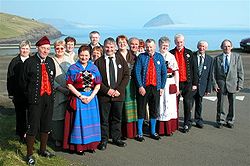
On the Faroe Islands, traditional dress is known as the føroysk klæði.
Greenland
[edit]In Greenland, traditional attire includes the anorak.
Estonia
[edit]Traditional dress of Estonia includes rahvarõivad, also known as rahvariided.[34]
Finland
[edit]Each region of Finland has a specific design of national costume (kansallispuku, nationaldräkt). They vary widely; some resemble Swedish clothing, and some reflect Russian influences. For Sámi people, each place has its own gákti or luhkka for colder weather.[35]
Iceland
[edit]In Iceland, traditional clothing is known as the þjóðbúningurinn.
Ireland
[edit]Traditional attire in Ireland includes the aran sweater, Irish walking hat, flat cap, grandfather shirt, Galway shawl, brogue, and costumes used in Irish stepdance.
Latvia
[edit]In Latvia, Latviešu tautastērpi (tautastērpi) vary by region.[36]
Lithuania
[edit]In Lithuania, traditional dress differs by region. Styles include the Aukštaičių rūbai, Žemaičių rūbai, Dzūkų rūbai, Suvalkiečių rūbai, and Klaipėdos krašto rūbai (also known as Mažoji Lietuva).[37]

Norway
[edit]
In Norway, each county and Svalbard) has a designated folk costume, or bunad. The most famous bunader are from Hardanger and Setesdal.[38] Sámi people wear gákti and, for colder weather, luhkka.
Sweden
[edit]In Sweden, the traditional folkdräkt varies by province. Since 1983, an official national costume, Sverigedräkten, has also been used.[39] The Bäckadräkten became the first unisex design in 2022.[40] The nationella dräkten was worn in the 18th century.
Sámi people wear gákti and, for colder weather, luhkka.
United Kingdom
[edit]England
[edit]
Traditional styles include English country clothing, Morris dance costumes, and English clogs.
In Northern England, traditional clothes include the maud and flat cap. In Lancashire, traditional attire includes the Lancashire shawl and clogs. In the northeast, traditional attire includes the rapper dance dress and Northumberland kilts and tartan.
In Southern England, traditional attire includes the smock. In Cornwall, traditional items include the sou'wester hat, fisherman's smock, gansey, bal-maiden clothing, and Cornish kilts and tartans. In London, traditional dress includes that of the pearly kings and queens.
Northern Ireland
[edit]In Northern Ireland, traditional dress is similar to the rest of Ireland.
Scotland
[edit]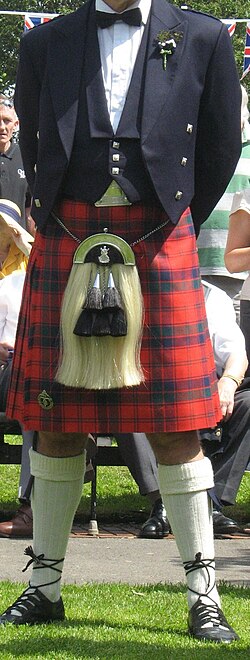
In Scotland, Highland dress includes the kilt or trews, tam o'shanter or Balmoral bonnet, doublet, Aboyne dress, and brogues or ghillies.
In the Scottish Lowlands, dress includes the maud and blue bonnet.
Wales
[edit]In Wales, the traditional Welsh costume is often worn by women on Saint David's Day or by folk dancers, such as at the Eisteddfod. It was historically worn in rural areas.
Southern Europe
[edit]Albania
[edit]Traditional clothing in Albania includes fustanella, tirq, xhamadan, and opinga.
Andorra
[edit]Traditional garments in Andorra include the barretina and espadrilles.
Bulgaria
[edit]
In Bulgaria, every town has its own design of a national costume (nosia), with different types of clothing traditional for each region of the country.[41][42]
Croatia
[edit]Traditional dress in Croatia includes the Lika cap, and the Šibenik cap.
Greece
[edit]
Traditional clothing in Greece includes the fustanella, breeches (vraka), and the Amalia costume. The Greek fisherman's cap is commonly worn in coastal villages by the Aegean Sea.
Italy
[edit]
Traditional clothing in Italy includes Italian folk dance costumes.
In South Tyrol, traditional garments include tracht and dirndl.
In Sardinia, each town has its own traditional Sardinian folk attire.
In Sicily, traditional dress includes the coppola and Arbëreshë costumes.
Kosovo
[edit]Traditional clothing in Kosovo includes the qeleshe, tirq, xhubleta, xhamadan, and opinga.
Malta
[edit]
In Malta, a traditional women's garment is the għonnella.
Montenegro
[edit]Traditional attire in Montenegro includes the Montenegrin cap.
North Macedonia
[edit]Traditional clothing in North Macedonia includes the Macedonian national costumes.
Portugal
[edit]In Portugal, each region has its own specific design of national costume. The most famous examples come from Viana do Castelo and Nazaré.
Romania
[edit]
Traditional clothing in Romania is represented by the national costume.
Serbia
[edit]In Serbia, each region has a distinct style of national costume. Traditional items include the Lika cap, Montenegrin cap, opanci, šajkača, and šubara.
Slovenia
[edit]In Slovenia, traditional clothing includes the gorenjska narodna noša.
Spain
[edit]Each autonomous region in Spain has its own national costume.
In Andalusia, traditional garments include the sombrero cordobés, traje de flamenca, traje de luces, and the montera.
In the Basque Country, traditional dress includes the beret and espadrilles.
Each island of the Canary Islands has its own style of traditional dress. In 1934, Néstor Martín-Fernández de la Torre designed a pan-island costume adopted mainly in Las Palmas on Gran Canaria.
In Catalonia, traditional garments include the barretina and faixa.
In Galicia, each province has its own regional costume.
Western Europe
[edit]Belgium
[edit]In Belgium, the bleu sårot is a traditional garment in Wallonia.
France
[edit]
Each region in France has a style of folk costume, varying by department. For example, Brittany has the Breton costume, which differs by department and is predominantly used in Celtic circles, pardons, and festivals. In the French Basque Country, traditional garments include the beret and espadrille.
Netherlands
[edit]Many areas, villages, and towns in the Netherlands used to have their own traditional clothing. In the 21st century, only a few hundred people still wear traditional dress daily, mainly in Staphorst, Volendam, and Marken. Outside of the Netherlands, the most well-known parts of Dutch folk costumes are the Dutch woman’s bonnet and klompen. In North Brabant, the poffer is a traditional garment.
Oceania
[edit]Australia and New Zealand
[edit]Australia
[edit]
In Australia, traditional attire of Aboriginal Australians includes fibrecraft-made clothing and possum cloaks. European Australian dress includes the cork hat and rural bushwear such as moleskin trousers, bush shirt, Akubra slouch hat, Driza-Bone coat, and Australian work boots. In the Torres Strait Islands, traditional dress includes the Augemwalli.
New Zealand
[edit]In New Zealand, Māori traditional garments include the piupiu, korowai, and kakahu huruhuru. Traditional attire for New Zealand Europeans includes the Swanndri bush jacket, slouch hat, walk shorts with knee-high socks, and black singlets with rugby shorts.
Melanesia
[edit]Fiji
[edit]In Fiji, traditional garments include the sulu, chamba (sulu i ra), tapa cloth (called masi), and i-sala. The kuta, made in the village of Dama in Bua Province, is another traditional item. Also traditional are sarees, shalwar kameez, and other Indo-Fijian traditional and religious clothing originating in South Asia.[43]
New Caledonia
[edit]In New Caledonia, traditional dress includes the manou and robes mission.[44]
Papua New Guinea
[edit]In Papua New Guinea, traditional dress includes the meri blaus, lap-lap, koteka, bilum (traditional string bags),[45][46] and grass covers.[46]
Solomon Islands
[edit]In the Solomon Islands, traditional attire includes the tapa cloth,[47][48] grass skirts, kap-kap,[49] and breastplates called tema, tambe, or tepatu.[50] For women, traditional attire includes the kabilato and aba obi; for men, traditional attire includes the fo'osae.[51]
Vanuatu
[edit]In Vanuatu, traditional clothing includes the Aelan dress and the lap-lap.[52]
Micronesia
[edit]Federated States of Micronesia
[edit]In the Federated States of Micronesia, traditional dress includes the lap-lap for men and grass skirts for women.
Palau
[edit]
In Palau, traditional dress includes the lap-lap for men and grass skirts for women.
Polynesia
[edit]
Cook Islands
[edit]In the Cook Islands, traditional dress includes the pareo.
French Polynesia
[edit]
In the French Polynesia, traditional dress includes the pareo.
Hawaii
[edit]In Hawaii, traditional garments include the holokū, and pāʻū skirts made of kapa or grass. Men traditionally wear the malo (loincloth). The Aloha shirt and muumuu are also traditional clothing.
Samoa
[edit]In Samoa, traditional clothing includes the lavalava, puletasi, and 'ie toga.
Tonga
[edit]In Tonga, traditional dress includes the tupenu, ta'ovala, and tapa cloth.
Further reading
[edit]- Sedakova, Irina; Vlaskina, Nina, eds. (2016). "Folk Costume". Folklore: Electronic Journal of Folklore. 66. doi:10.7592/fejf2016.66. ISSN 1406-0957.
- Shukla, Pravina (2015). Costume: performing identities through dress. Bloomington: Indiana University Press. ISBN 978-0-253-01577-8.
- "What is a Folk Costume?". Nordic Folklife: Sustaining Scandinavian Folk Arts in the Upper Midwest. University of Wisconsin-Madison. Retrieved 2025-06-25.
References
[edit]- ^ Reese, Debbie (15 May 2007). "The word "costume" and American Indians". American Indians in Children's Literature. Retrieved 9 November 2023.
- ^ Arce, Isis (4 February 2019). "Native Regalia is NOT a Costume!". Voices of Native Youth. Retrieved 9 November 2023.
- ^ Higgins, Julissa (7 May 2018). "Opinion: Why It's Time to Stop Using the Word "Garb"". The Fashion Studies Journal. Retrieved 9 November 2023.
- ^ Martinez, Gimeno; Leerssen, Joep (2022). "Dress, design: Introductory survey essay". Encyclopedia of Romantic Nationalism in Europe. Amsterdam: Study Platform on Interlocking Nationalisms. Retrieved November 7, 2023.
- ^ Chatterjee, Saheli. "Anthropology in Fashion: Cultural Clothing in Central Africa". YOAIR Blog. Retrieved 8 November 2023.
- ^ "Traditional Tuesday: Cameroon edition". Nene Fashion. 4 March 2015. Retrieved 8 November 2023.
- ^ Rabimov, Stephan (July 12, 2017). "Gabon's 'Heritage' On Display At The New York Fashion Week: Men's". Forbes. Retrieved 8 November 2023.
- ^ "Come Discover the Culture of Comoros". Adore Comores. 7 June 2021. Retrieved 11 November 2023.
- ^ a b c Chatterjee, Saheli. "Anthropology in Fashion: Cultural Clothing in Eastern Africa". YOAIR Blog. Retrieved 8 November 2023.
- ^ a b c d Chatterjee, Saheli. "Anthropology in Fashion: Cultural Clothing in Southern Africa". YOAIR Blog. Retrieved 8 November 2023.
- ^ Kanungo, Pallavi (February 23, 2023). "Ohorokova: The African attire born out of protest". HT School. Hindustan Times. Retrieved 8 November 2023.
- ^ a b Chatterjee, Saheli. "Anthropology in Fashion: Cultural Clothing in Western Africa". YOAIR Blog. Retrieved 8 November 2023.
- ^ a b Condra, Jill, ed. (2013). Encyclopedia of National Dress, Vol. I. Santa Barbara, CA: ABC-CLIO. p. 123. ISBN 978-0-313-37637-5.
- ^ a b Chatterjee, Saheli. "Anthropology in Fashion: Cultural Clothing in Central Asia". YOAIR Blog. Retrieved 8 November 2023.
- ^ "The Clothing of Taiwan's Indigenous People– Men and Women's Clothes". Digital Taiwan - Culture & Nature. Retrieved 10 November 2023.
- ^ "Dress and Dressing Up". Taiwan Memory Exhibition. National Central Library. Retrieved 10 November 2023.
- ^ "Bunun". Council of Indigenous Peoples. 20 December 2010. Retrieved 10 November 2023.
- ^ Hejzlarová, Tereza (2019). "Traditions and Innovations in the Clothing of Southern Altaians". Annals of the Náprstek Museum. 40 (1): 13–17. doi:10.2478/anpm-2019-0002. S2CID 208534450. Retrieved 2 December 2023.
- ^ a b c d e Chatterjee, Saheli. "Anthropology in Fashion: Cultural Clothing in South Asia". YOAIR Blog. Retrieved 8 November 2023.
- ^ "What to Wear in Bangladesh". whattowearonvacation. Retrieved 19 July 2023.
- ^ Al Mamun, Abdullah (May 28, 2023). "Traditional Dress of Bangladesh That Reflect Our Culture and Heritage". Bangladeshi Heritage. Retrieved November 7, 2023.
- ^ Shah, Shalini (October 31, 2016). "Bhutan's Queen Mother Sangay Choden Wangchuck on weaves in everyday life". Vogue India. Retrieved November 3, 2023.
- ^ Lhamo, Passang (April 2, 2019). "Driglam Namzha: Why The Bhutanese Do What They Do". Daily Bhutan. Retrieved November 3, 2023.
- ^ a b Altmann, Karin (2016). Fabric of Life - Textile Arts in Bhutan: Culture, Tradition and Transformation. Berlin, München, Boston: De Gruyter. pp. 30–32. doi:10.1515/9783110428612. ISBN 978-3-11-042861-2.
- ^ "Lhotshampas". Minority Rights. 6 May 2020. Retrieved 10 November 2023.
- ^ a b Chatterjee, Saheli. "Anthropology in Fashion: Cultural Clothing in India, Bangladesh, and Pakistan". YOAIR Blog. Retrieved 8 November 2023.
- ^ Sawe, Benjamin (April 25, 2017). "What Are Examples Of Traditional Indian Clothing?". WorldAtlas. Retrieved November 7, 2023.
- ^ a b c d e Chatterjee, Saheli. "Anthropology in Fashion: Cultural Clothing in Southeast Asia". YOAIR Blog. Retrieved 8 November 2023.
- ^ Phelan, Miriam (18 August 2017). "Sephardi Dress". Jewish Museum London. Retrieved 3 December 2023.
- ^ "Traditional Dress". The Museum of Russian Art. Retrieved November 3, 2023.
- ^ National Center of Folk Culture "Ivan Honchar Museum". "Get the Ukrainian Look: Ukrainian Folk Dress". Google Arts & Culture. Retrieved November 3, 2023.
- ^ Béni, Alexandra (January 18, 2018). "Get to know the invaluable Hungarian folk costumes". Daily News Hungary. Retrieved November 3, 2023.
- ^ The State Ethnographic Museum in Warsaw. "Regional Types - Traditional Polish Folk Costumes". Google Arts & Culture. Retrieved November 3, 2023.
- ^ "Estonian Folk Costumes". rahvaroivad.ee. NGO Estonian National Costume (MTÜ Rahvarõivas). Retrieved December 23, 2023.
- ^ "The National Costume Center of Finland". craftmuseum.fi. Craft Museum of Finland. Retrieved November 3, 2023.
- ^ "Latvian National Costumes". The National Costume Center SENĀ KLĒTS. Retrieved November 3, 2023.
- ^ "National Costumes". Lithuanian National Culture Centre. Retrieved November 3, 2023.
- ^ "Bunad history". bunadogfolkedrakt.no. Norsk institutt for bunad og folkedrakt. Retrieved November 3, 2023.
- ^ "Swedish Traditional Clothing: The Ultimate Guide". seekscandinavia.com. Seek Scandinavia. May 31, 2022. Retrieved November 3, 2023.
- ^ Welin, Matilda (January 10, 2023). "The Scandinavian Folk Clothing Right for Now". The Collection. BBC. Archived from the original on March 15, 2023. Retrieved February 27, 2024.
- ^ "Носиите – Жеравна 2014". Nosia.bg. 2013-06-16. Retrieved 2014-08-27.
- ^ "Български народни носии – България в стари снимки и пощенски картички". Retrobulgaria.com. Archived from the original on 2019-04-28. Retrieved 2014-08-27.
- ^ "Fijians of Indian Descent – Clothing". Think Pacific. Think Pacific Limited. Retrieved November 7, 2023.
- ^ "Check out our iconic products: Mother Hubbard dresses". Ardici. Ardici: Artisanat de Nouvelle-Calédonie. Retrieved November 7, 2023.
- ^ McDonald, Hamish (January 18, 2023). "Papua New Guinea's 'bilums' weave together function, fashion". Nikkei Asia. Mount Hagen, Papua New Guinea. Retrieved November 7, 2023.
- ^ a b "Weaving and clothing". archives.anu.edu.au. Australian National University. Retrieved November 7, 2023.
- ^ "Tapa: Pacific Style - Solomon Islands tapa". tepapa.govt.nz. Museum of New Zealand Te Papa Tongarewa. Retrieved November 7, 2023.
- ^ "Traditional Tapa Valued in Tikopia". Solomon Times. Honiara, Solomon Islands. March 5, 2008. Retrieved November 7, 2023.
- ^ Leigh, Carolyn; Perry, Ron. "Solomon Islands jewelry". Art-Pacific.com. Retrieved November 7, 2023.
- ^ "Breastplate (Tema, Tambe, or Tepatu)". metmuseum.org. The Metropolitan Museum of Art. Retrieved November 7, 2023.
- ^ Burt, Ben (March 1990). "Kwara'ae Costume Ornaments". Expedition Magazine. Vol. 32, no. 1. Retrieved November 7, 2023.
- ^ Cummings, Maggie (2013). "Looking Good: The Cultural Politics of the Island Dress for Young Women in Vanuatu" (PDF). The Contemporary Pacific. 25 (1): 33–65. doi:10.1353/cp.2013.0007. hdl:10125/32890. S2CID 145598013. Retrieved November 7, 2023.



















